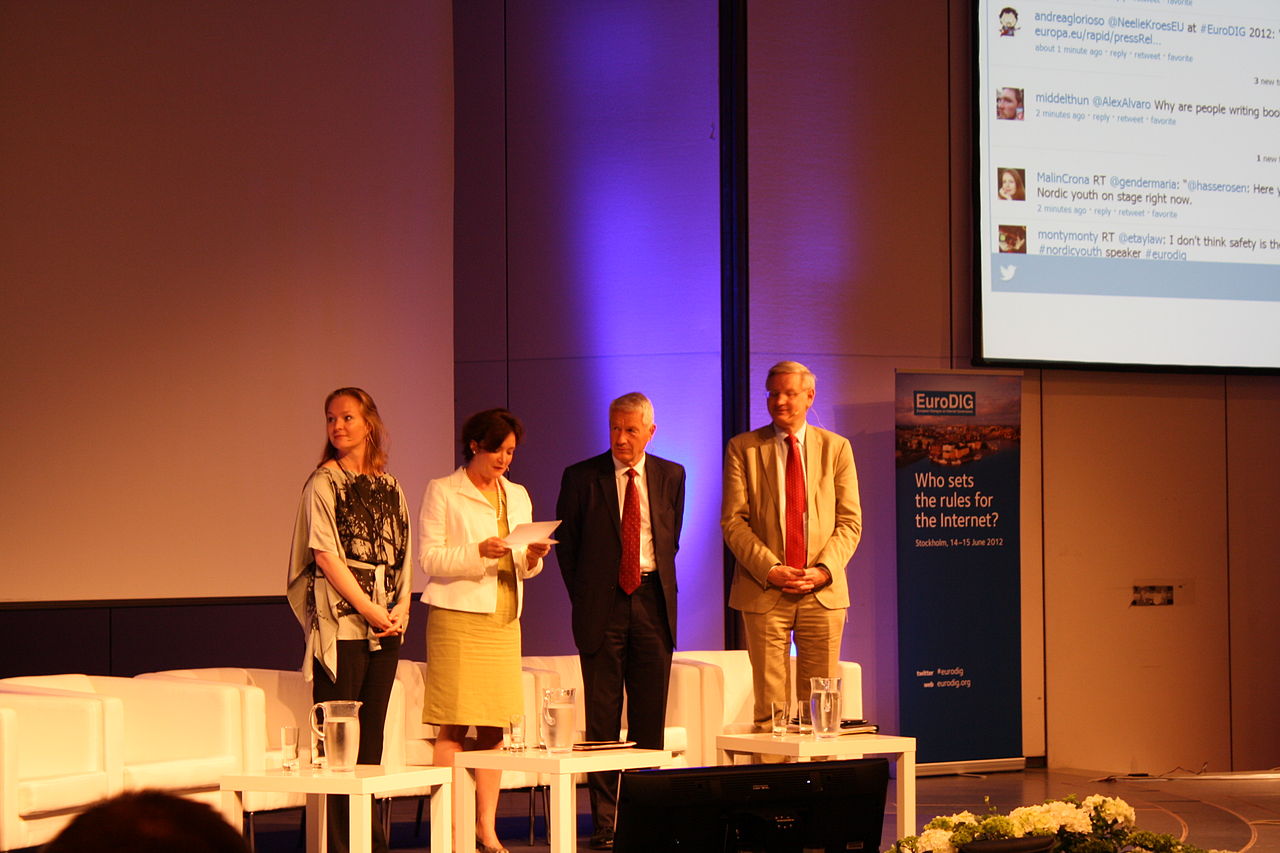Eurodig 2012 Opening

By Emily Taylor
The organisers of EuroDIG asked me to moderate opening of the 2012 conference. EuroDIG itself spans two days of conference. I had never been involved in EuroDIG before, and was impressed with its inclusiveness, the participative way it sets its agenda, and the stellar line up of speakers.
As often happens, the opening became congested with speeches from great and good, including Thorbjorn Jagland, President of the Council of Europe, European Commissioner Neelie Kroes and Swedish IT Minister Anna-Karin Hatt. From my place, lonely on the platform, these seemed to go on forever.
The speeches were followed by a panel discussion on Internet democracy changes, which I moderated. Joining Kroes and Hatt on the panel were Alexander Alvaro, vice-president of the European Parliament, John Higgins, president of Digital Europe, Malcolm Hutty, president of EuroISPA, and Peter Matjasic, president of the European Youth Forum.
The debate was lively and there was a constant stream of questions from the audience. A highlight was a disagreement between a youth speaker from the audience, Neelie Kroes and Alexander Alvaro about the interplay between child protection and net freedoms. The youth speaker stated that everyone seemed to be “paranoid” about safety on the Internet, and to think that there were rapists lurking in every shadow. Neelie Kroes said she “disagree 100%… I’m too old to be paranoid”. She went on to talk about the importance of protecting vulnerable people online. Alexander Alvaro judged the mood of the room perfectly when he said:
“Child abuse has become the terrorism of the Internet. It has become the justification for blocking of Web sites and censorship of Web sites.”
The full exchange is at page 18 of EuroDIG’s transcript of the opening session. The transcript also includes the full text of the opening speeches and the panel discussion.
Herding cats
The Swedish ccTLD registry organised a session at EuroDIG on the way the Internet is changing democracy, and asked me to moderate. It was another chance for me to meet one of my Internet heroes, Carl Bildt. Also on the panel was Thorbjorn Jagland of the Council of Europe, former Prime Minister of Norway, and Chair of the committee that awards the Nobel Peace Prize. He had to leave the session early to go back to Oslo to present Aung San Suu Kyi with her Nobel Peace Prize, a ceremony delayed for over 20 years.
Marietje Schaake, MEP and rising star, also joined the discussions, with Mats Svegfors, head of the Swedish pubic service broadcaster, and Ehsan Norouzi, an Iranian political blogger.
The Queen of Sweden gave a speech prior to the session, and it was funny to see the room full of iconoclastic techies meekly following royal protocol, standing, sitting and clapping to order. I noticed that in the seat beside me during the Queen’s speech was a member of SAPO, the Swedish secret police – it all felt a bit like a Stieg Larsson novel.
The panel started a bit awkwardly, as each panelist was announced individually, and then walked on from the wings. A bit glitzy, and no one knew quite what to do. I saw both Carl Bildt and Thorbjorn Jagland looking at me, as if they were expecting me to have a plan. Nervously, I blurted out the first thing that popped into my head. From the audience Patrik Fältström tweeted:
‘Wonderful @etaylaw to two former prime ministers at #eurodig : “You guys organize yourself”‘.
After that we got into discussions, which ranged widely. Has democracy been changed by the Internet? Yes, but it is not clear how. Marietje Schaake compared things now to a snow dome that had been shaken up. It is still not clear how things will fall out. There were plenty of challenging questions from the audience. Ehsan Norouzi pointed out that European companies are selling surveillance and website blocking technology to oppressive regimes, which the regimes themselves would not be able to produce, in his view. Censorship is never justified, said Mats Svegfors, but that doesn’t mean that absolutely everything should be published. Carl Bildt, resolutely unhysterical, pointed out that all of human life is represented on the Internet, the good, the bad, the ‘distinctly evil’, and that democratic discussions have faced similar issues through time. Thorbjorn Jagland made the distinction between the wealth of online chatter, and actually having something to say – and drew the vivid example of Aung San Suu Kyi, who despite years of isolation had become one of the most powerful voices in the world.
Despite being so illustrious, the panelists were down to earth and friendly. Re-reading their interventions now, they are thoughtful, punchy and well informed, as are the audience interventions. The session felt like a great big conversation between audience and panel. Mats Svegfors said afterwards that was the best panel he had been on for ages, and Carl Bildt congratulated me on a successful job ‘herding cats’.

